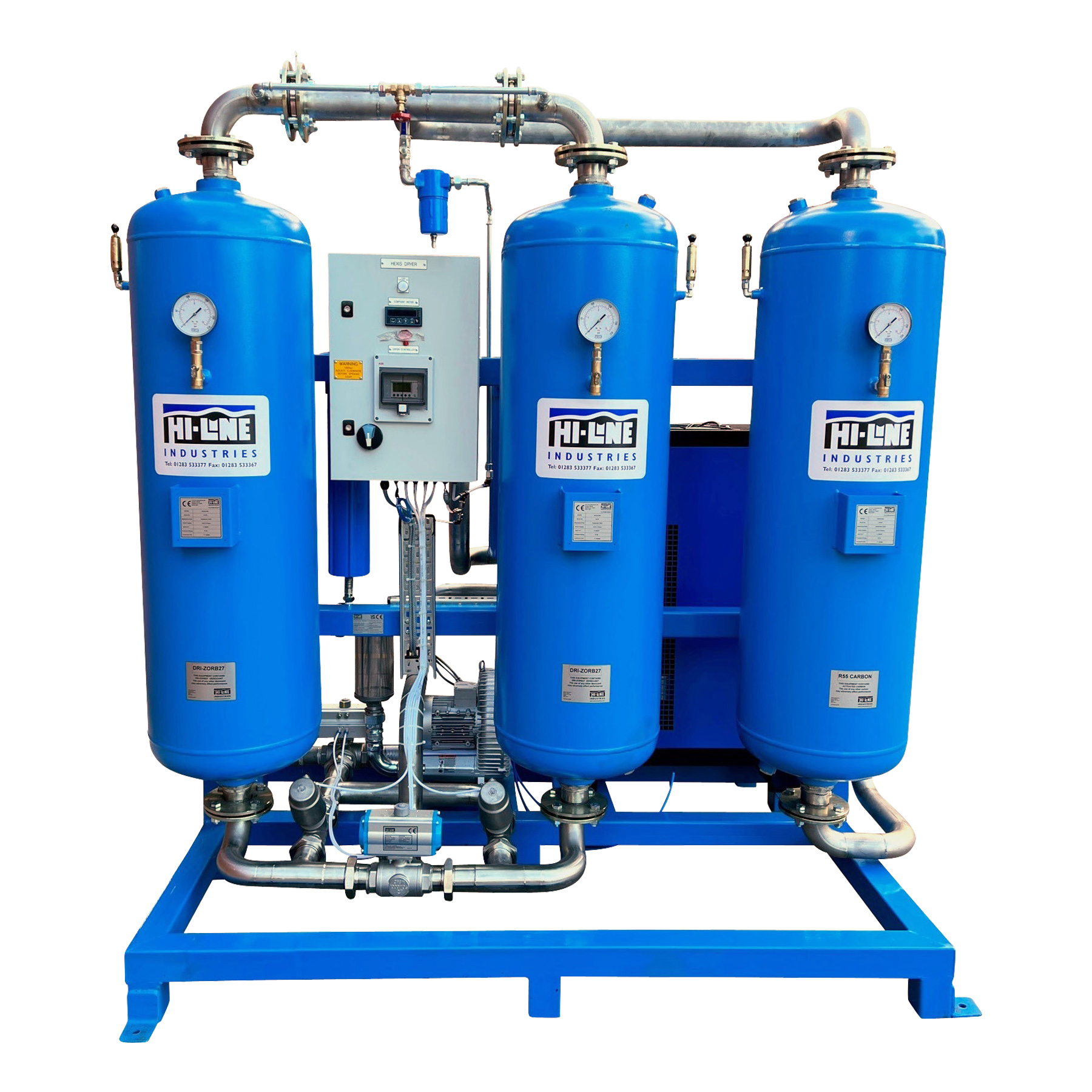Estimates suggest that Class 4 moisture content according to ISO 8573-1 is acceptable in the majority of compressed air system applications, thus supporting the use of refrigeration dryer technology. However, where applications demand higher levels of moisture removal, desiccant tends to be the go-to technology. The long-standing problem here is the higher cost associated with desiccant dryers, which is why Hi-line Industries, a UK-based leader in the design, manufacture and installation of energy-efficient compressed air purification equipment, is addressing this issue with its new Hi-Plex dual technology dryers. This hybrid solution combines Hi-line’s established refrigeration and PSA (Pressure Swing Adsorption) air treatment technologies, creating an energy-efficient system at low capital cost compared with standard heat-regeneration desiccant air dryers.
So how does Hi-Plex work? Well, a Hi-line Tundra refrigeration system first removes bulk moisture via zero loss auto-drains, after which it chills the air to +1°C in the heat exchanger, condensing out all water to a +3°C PDP (Pressure Dewpoint). From here, the pre-dried air passes into an energy-efficient HPSA (Hi-line Pressure Swing Adsorption) dryer where it is further dried via adsorption to lower dewpoints of between -20°C PDP and -70°C PDP depending on end-user requirements, meeting Class 2 moisture content in accordance with ISO8573.1. As a point of note, Hi-line can add an Activated Carbon Tower for Class 0 applications.
Hi-Plex regeneration takes place by deploying a vacuumed-assisted fan, which uses a reduced amount of purge air to cause a desorption effect within the desiccant beds. A side-channel vacuum pump removes the small amount of remaining water (via exhaust silencers) back to the atmosphere from where it came. This plug and play system is fully automatic: wet air in – dry air out.
Continued ……
Importantly, Hi-Plex high-performance dual technology dryers typically run at only 1-2% purge in comparison with 13-15% on a standard desiccant air dryer. Even more savings are achievable following the specification of Hi-line’s optional AEMS (Automatic Energy Management System) for dewpoint control. AEMS features a digital dewpoint readout, high-humidity alarm, and set and demand regeneration function. As a result, customers can ensure they only use a minimal amount of energy to achieve dewpoints at any given time. In total, energy savings of over 70% are achievable compared with a conventional desiccant dryer, offering far quicker return on investment (ROI).
Every Hi-Plex dual technology dryer is application-specific, but built from standard off-the-shelf Hi-line products. The company adds all the components, stainless steel pipework and filtration to a compact skid at its UK headquarters and manufacturing facility in Burton-upon-Trent. Hi-line will happily cater for any special requirements, such as even smaller footprint or lower height dimension to fit inside a low-ceiling compressor house, for example. The company can also facilitate connection to customer software or a BMS (Building Management System).
Hi-Plex systems are available from 165 to 1700 Scfm, and from 3.1 to 10.8 kW installed power. A five-year warranty is standard subject to service criteria.
Estimates suggest that Class 4 moisture content according to ISO 8573-1 is acceptable in the majority of compressed air system applications, thus supporting the use of refrigeration dryer technology. However, where applications demand higher levels of moisture removal, desiccant tends to be the go-to technology. The long-standing problem here is the higher cost associated with desiccant dryers, which is why Hi-line Industries, a UK-based leader in the design, manufacture and installation of energy-efficient compressed air purification equipment, is addressing this issue with its new Hi-Plex dual technology dryers. This hybrid solution combines Hi-line’s established refrigeration and PSA (Pressure Swing Adsorption) air treatment technologies, creating an energy-efficient system at low capital cost compared with standard heat-regeneration desiccant air dryers.
So how does Hi-Plex work? Well, a Hi-line Tundra refrigeration system first removes bulk moisture via zero loss auto-drains, after which it chills the air to +1°C in the heat exchanger, condensing out all water to a +3°C PDP (Pressure Dewpoint). From here, the pre-dried air passes into an energy-efficient HPSA (Hi-line Pressure Swing Adsorption) dryer where it is further dried via adsorption to lower dewpoints of between -20°C PDP and -70°C PDP depending on end-user requirements, meeting Class 2 moisture content in accordance with ISO8573.1. As a point of note, Hi-line can add an Activated Carbon Tower for Class 0 applications.
Hi-Plex regeneration takes place by deploying a vacuumed-assisted fan, which uses a reduced amount of purge air to cause a desorption effect within the desiccant beds. A side-channel vacuum pump removes the small amount of remaining water (via exhaust silencers) back to the atmosphere from where it came. This plug and play system is fully automatic: wet air in – dry air out.
Continued ……
Importantly, Hi-Plex high-performance dual technology dryers typically run at only 1-2% purge in comparison with 13-15% on a standard desiccant air dryer. Even more savings are achievable following the specification of Hi-line’s optional AEMS (Automatic Energy Management System) for dewpoint control. AEMS features a digital dewpoint readout, high-humidity alarm, and set and demand regeneration function. As a result, customers can ensure they only use a minimal amount of energy to achieve dewpoints at any given time. In total, energy savings of over 70% are achievable compared with a conventional desiccant dryer, offering far quicker return on investment (ROI).
Every Hi-Plex dual technology dryer is application-specific, but built from standard off-the-shelf Hi-line products. The company adds all the components, stainless steel pipework and filtration to a compact skid at its UK headquarters and manufacturing facility in Burton-upon-Trent. Hi-line will happily cater for any special requirements, such as even smaller footprint or lower height dimension to fit inside a low-ceiling compressor house, for example. The company can also facilitate connection to customer software or a BMS (Building Management System).


